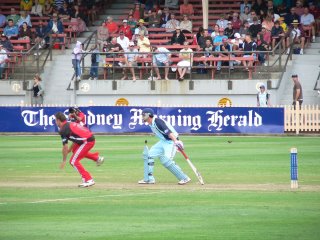 Chi'na, my spoilt pup, having a snooze
Chi'na, my spoilt pup, having a snoozeWork was a breeze with only half the staff in the office. We ended up playing soccer against Pro' on Thursday, a heated game (in more ways than one) that resulted in a 8-6 victory to us. Hot: the midday sun. Hot: a shirtless Toro working up a sweat. Hot: the competitive streak enhanced by the searing climate. I took on Fat Tony (a particularly reviled Pro' player with a penchant for aggression and keeping a constant offside position) and won, fighting for the ball up the right wing and clearing it for the forwards to play into goal. So proud of that.
The Ent was in charge on Friday. He forced us to retire at 4pm and shepherded the staff to the Chelsea for an undeserved drink. I distinctly recall everyone going "for one" and somehow ending up with five jugs between the six of us. I didn't even pay for any of it. I seriously have to curb my alcoholic intake after spending the last four Fridays practically blotto. Curb... after tonight, that is. Still, interesting information gleaned while perched on a bar stool; some of it touched on the future of our company, some of it was about past decisions. Alias even mentioned Stalkie in relation to her obsession with Toro and then brought up a past incident involving Chief. (Chief was practically "la la la I can't hear you" at this, which was hilarious). Also shared news on Christmas, which turned into plans for NYE and the inevitable groan about coming back to work on the 2nd.
Everyone then skedaddled at around 6:30pm for other appointments. I didn't have anything planned except sleep but ended up catching the bus home (due to trackwork) then staying up half the night dancing to the George Michael DVD that my flatmate bought me for Christmas. Woo!
Yesterday was spent entertaining my brother's friend Eve, who is visiting from KL. She's a former fashion journalist turned freelancer working as an image consultant, so you can guess that, with my bohemian laissez-faire, I didn't really take to her. My cousin, Aunty M, met her separately in Malaysian publishing circles and didn't like her attitude about networking and all that fashionista superficiality. After what I experienced yesterday, I second the motion.
I met her in Paddington - late, I might add, because I'd accidentally taken the bus to Bondi Junction via the back streets of Woollahra and had to take one back down Oxford Street - then we went for a late lunch (it was 3pm by then) but not before I kept losing her to the high fashion boutiques along the strip. Yawn. Eventually we made it into the city and over to Paddy's. I was going to leave her there to meet with an acquaintance but then I found out that this guy was a freelancer established in Sydney so I thought he'd be interesting to talk to (and he was - we got on like a house on fire) but then Eve started getting bored with Market City so he left and I took her on a short tour of Newtown, which she didn't like as much as Paddington. But at last the day grew old and I excused myself with a 'hope you enjoy yourself in Sydney' and 'have a happy new year' before gratefully boarding a bus home.
I got to thinking, then, how I would categorise myself in terms of my Sydneysider-ness. I've lived here all my life and although I've been travelling and have seen far greater, more exciting places, I can't help feeling that I am a product of Sydney. I'm certainly not a Hills girl, even though that's where I spent most of my upbringing, and I barely recognise the south, west and east. I think I am a northerner with an inner west attitude, which I basically translate as someone who had all the opportunities of a certain kind of affluence, but also her feet on the ground, Newtown-before-gentrification-style. Make of that what you will.
Anyway, it's almost time for the 9 o'clock fireworks, time to head to the backyard. Have a happy new year, however you choose to celebrate it!


